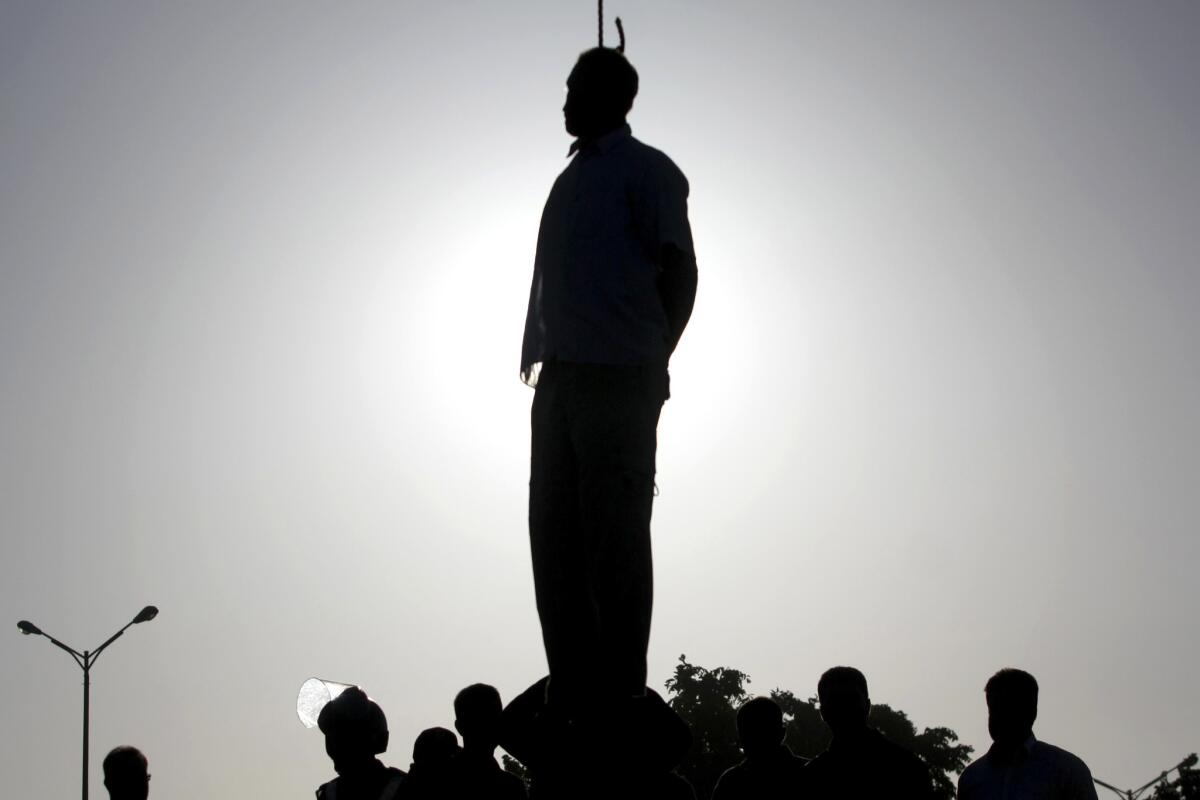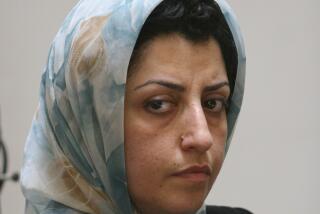Iranian convict survives hanging, faces second attempt

The case of an Iranian drug smuggler who faces a second execution attempt after surviving his first hanging has stirred an international outcry over what human rights groups consider the country’s excessive resort to the death penalty.
London-based Amnesty International issued an appeal Thursday for the Tehran regime to spare the life of the convict, identified in Iranian media as Alireza M., a 37-year-old hanged at a prison in the northeastern city of Bojnurd on Oct. 9.
Iranian media reported that the man hung for 12 minutes from a noose hoisted by a crane in the prison courtyard, and was pronounced dead by a doctor who witnessed the execution.
The state-run Jam-e-Jam newspaper said morgue workers the following day noticed steam inside the plastic covering the convict’s body and discovered that he was still breathing, the Guardian reported.
The man was transferred to Imam Ali Hospital in Bojnurd and awaits another execution attempt, to fulfill his death sentence.
“When a convict is sentenced to death, he must die after the sentence is carried out,” said Judge Nourollah Aziz Mohammadi, according to the Iranian newspaper. “Now that he is alive, we can say the sentence was not carried out and must be repeated.”
Under common law, though, a prisoner who survives execution by hanging or stoning is considered to have been acquitted, legal analysts told a reporter for the Los Angeles Times in Tehran.
The condemned man’s fate reportedly has been of secondary interest to Iranians, who are more focused on the prospects of possible sanctions relief after President Hassan Rouhani’s new team of nuclear negotiators met with representatives of six major world powers this week in what appears to have been a good start toward a nuclear pact.
It was unclear when authorities would return the condemned man to the gallows. Amnesty International quoted a judge as saying the man would be executed “once medical staff confirm his health condition is good enough.”
Under Iranian law, convicts should be conscious and healthy before execution, the Guardian said.
But rights advocates and opponents of capital punishment in Europe, the Middle East and the United States condemned the planned second execution attempt as the epitome of cruel punishment.
“The horrific prospect of this man facing a second hanging, after having gone through the whole ordeal already once, merely underlines the cruelty and inhumanity of the death penalty,” Philip Luther, Amnesty’s Middle East and North Africa program director, said in a statement. “The Iranian authorities must immediately halt Alireza M.’s execution and issue a moratorium on all others.”
The New York-based International Campaign for Human Rights in Iran had urged Tehran to halt death sentences earlier this month, noting that the pace of executions had accelerated since the early August inauguration of the purportedly reform-minded Rouhani.
“While Rouhani was promoting a softer image of Iran internationally during his visit to New York two weeks ago, it was business as usual on the domestic front with scores of prisoners put to death following unfair trials,” said Hadi Ghaemi, the campaign’s executive director. “Since Rouhani’s inauguration, the increasing number of prisoners being sent to the gallows is indefensible.”
The campaign reported that in the two weeks between Sept. 11 and Sept. 25, Iran sent a record 50 prisoners to the gallows, and that at least 402 executions have been carried out so far this year.
Amnesty put the number of Iranian death sentences carried out this year at 508, although noting that 221 of them have yet to be officially confirmed.
Iran Human Rights Documentation Center, based in New Haven, Conn., reported on Oct. 8 that Iran had put at least 125 of its citizens to death since Rouhani’s inauguration.
“The rapid pace of executions over the past month shows that while talk of human rights reforms has intensified with the release of high-profile political prisoners and promises for more pardons, there is still a long way to go in pushing change on the margins of society,” said Gissou Nia, executive director of the documentation center. “The seeming trend for reform has yet to extend to Iran’s liberal application of the death penalty, which disproportionately affects ethnic minorities and the poor.”
ALSO:
Slavery still haunts Africa, where millions remain captive
Seven Balkan wannabes still need reforms to join EU, report says
Britain to accept public input in debate on U.S. and domestic spying
Twitter: @cjwilliamslat
Special correspondent Ramin Mostaghim in Tehran contributed to this report.
More to Read
Start your day right
Sign up for Essential California for news, features and recommendations from the L.A. Times and beyond in your inbox six days a week.
You may occasionally receive promotional content from the Los Angeles Times.







